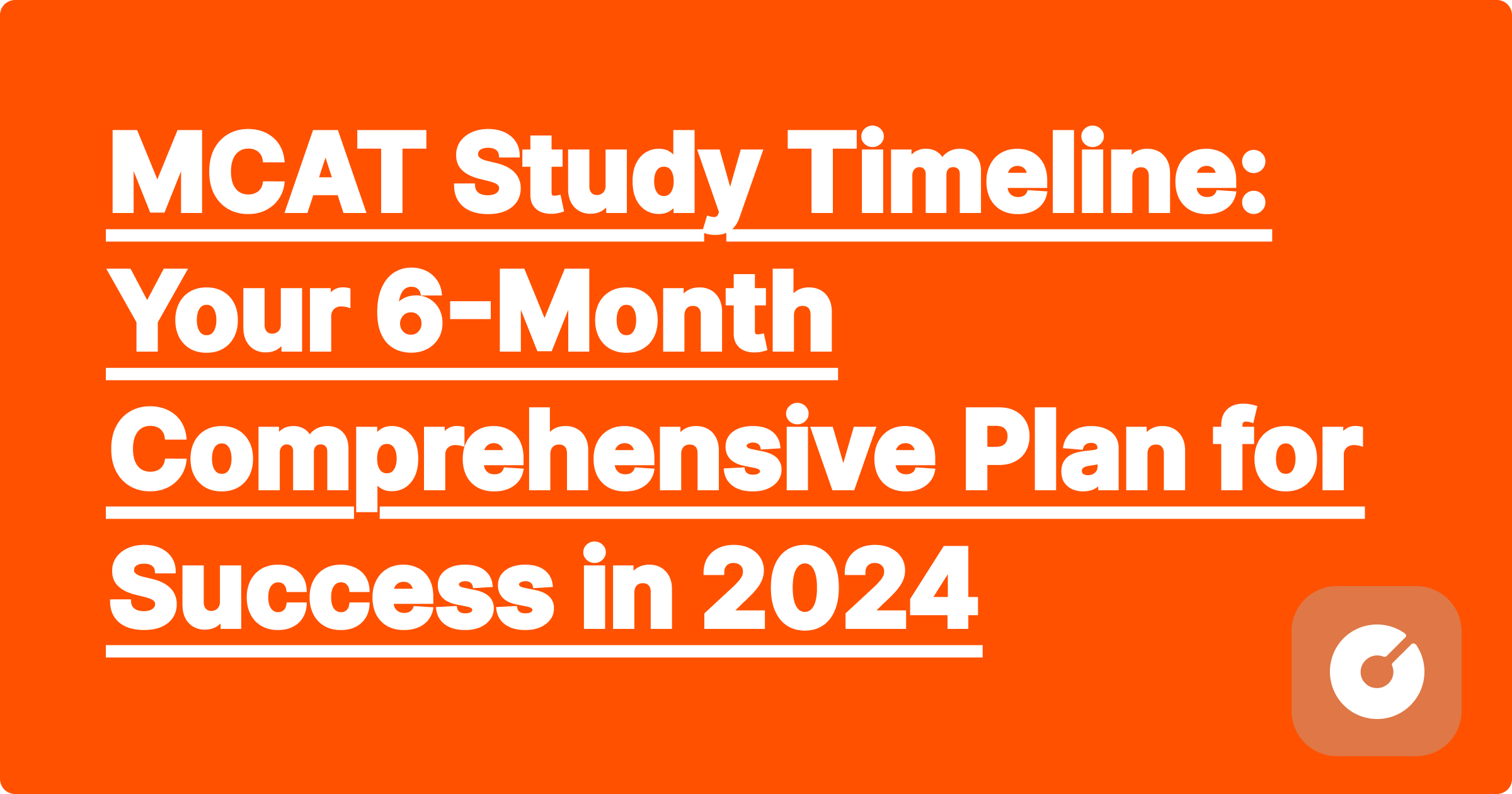
The Medical College Admission Test (MCAT) is a critical hurdle for aspiring medical students. With a demanding curriculum and high stakes, a well-structured study plan is essential. This comprehensive guide provides a 6-month timeline, incorporating proven strategies and actionable advice to help you achieve your target MCAT score and increase your chances of medical school acceptance. While precise 2024 data on acceptance rates is not yet fully compiled by application deadlines, we will use the latest available data and trends to inform our guidance.
Before diving into the timeline, let's review the MCAT's key aspects. The exam consists of four sections:
Biological and Biochemical Foundations of Living Systems: Covers biology, general chemistry, and organic chemistry.
Chemical and Physical Foundations of Biological Systems: Focuses on general chemistry and physics.
Psychological, Social, and Biological Foundations of Behavior: Explores psychology and sociology.
Critical Analysis and Reasoning Skills (CARS): Assesses reading comprehension and critical thinking skills.
Each section is scored on a scale of 118-132, with a total score ranging from 472 to 528. The average MCAT score varies by school but generally falls in the range of 510-518 for competitive programs. Remember that the MCAT score is just one factor in the admissions process; GPA, extracurricular activities, letters of recommendation, and personal essays also play significant roles. Many top medical schools have acceptance rates below 5%, highlighting the intensely competitive nature of the application process. For example, Harvard Medical School's acceptance rate typically hovers around 3-4%.
This plan assumes a dedicated study schedule of 20-30 hours per week. Adjust this based on your individual needs and learning style.
Month 1-2: Content Review – Biological and Biochemical Foundations & Chemical and Physical Foundations
Weeks 1-4: Focus on Biology and General Chemistry. Utilize textbooks, online resources (Khan Academy, Kaplan, Princeton Review), and flashcards. Create a detailed schedule for each chapter and stick to it.
Weeks 5-8: Tackle Organic Chemistry and Physics. These sections often require more time and effort. Consider working with a tutor if you struggle with specific concepts.
Month 3-4: Content Review – Psychological, Social, and Biological Foundations & CARS
Weeks 9-12: Dive into Psychology and Sociology. This section requires a strong understanding of key concepts and theories. Practice active recall and utilize practice questions.
Weeks 13-16: Dedicate significant time to CARS. This section requires consistent practice. Read extensively, focusing on improving reading speed and comprehension.
Month 5: Practice Exams and Content Refinement
Weeks 17-20: Take full-length practice exams (at least 3-4). Analyze your performance to identify your strengths and weaknesses. Review content areas where you scored poorly.
Month 6: Focused Review and Final Preparation
Weeks 21-24: Concentrate on your weak areas identified through practice exams. Refine your test-taking strategies. Take at least 1-2 more full-length practice exams under timed conditions. Prioritize sleep and maintain a healthy lifestyle.
The cost of MCAT prep varies significantly depending on your chosen resources.
Prep Courses: Kaplan, Princeton Review, and others offer comprehensive courses ranging from $1,500 to $3,000.
Books and Materials: Expect to spend $300-$500 on textbooks, practice tests, and other materials.
Tutoring: One-on-one tutoring can cost $50-$150 per hour, adding substantial expense to your preparation.
Total cost can range from $2,000 to $4,000 or more, depending on your individual needs and choices. Explore financial aid options, scholarships, and payment plans offered by prep companies.
Create a Realistic Study Schedule: Consistency is key. Establish a daily or weekly schedule that fits your lifestyle.
Active Recall: Test yourself frequently using flashcards, practice questions, and self-testing.
Practice Exams: Regularly take full-length practice exams under timed conditions to simulate the real test environment.
Seek Feedback: Don’t hesitate to ask for help from professors, tutors, or peers.
Prioritize Self-Care: Get enough sleep, eat healthy, and exercise regularly to maintain physical and mental well-being.
* Time Management: Develop effective time management skills to balance studying, other responsibilities, and personal life.
Sarah, a pre-med student, utilized a similar 6-month study plan. She invested in a Kaplan prep course, supplementing with online resources. She consistently practiced active recall, took regular practice exams, and focused on her weaker areas. By maintaining a balanced study schedule and prioritizing self-care, she improved her score by 15 points, exceeding her target score and gaining acceptance into her dream medical school.
Preparing for the MCAT is a challenging yet rewarding process. With a well-structured 6-month plan, effective study strategies, and consistent effort, you can significantly increase your chances of success. Remember to prioritize self-care, stay organized, and leverage all available resources to achieve your target score and pursue your medical aspirations. Good luck!
Second Career Medical Students: Changing Paths to a Rewarding Career
Foreign Medical Schools for US Students: A Comprehensive Guide for 2024 and Beyond
Osteopathic Medicine: Growing Acceptance and Benefits for Aspiring Physicians
Joint Degree Programs: MD/MBA, MD/JD, MD/MPH – Your Path to a Multifaceted Career in Medicine
AMCAS Application Timeline: Your Month-by-Month Guide to Success in 2024
Board Exam Preparation Timeline: Your Roadmap to USMLE Success
NIH Summer Research Programs for Pre-Med Students: Your Ultimate Guide to Success in 2024
Pre-Med Summer Programs at Top Universities: Your Guide to Success in 2024
MCAT Retake Strategy: When and How to Improve Your Score in 2024
Best MCAT Prep Courses Reviewed: Kaplan vs. Princeton Review vs. Blueprint for 2024